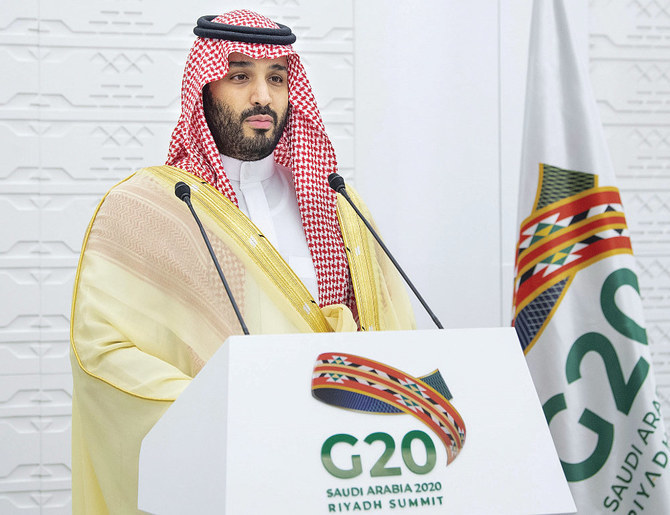RIYADH: Saudi Arabia’s Crown Prince Mohammed bin Salman recommended that going forward, the Group of Twenty (G20) organization should hold two annual summits, a virtual one in the middle of the year, and a physical summit at the end.
Minutes before the closing remarks of the Kingdom’s G20 presidency, the crown prince said: “I would like to thank all of our ministers and officials for their active participation during many meetings, and the succession of this year’s programs despite the difficult circumstances.”
The coronavirus disease (COVID-19) represented an unprecedented global threat, prompting the Kingdom to hold two summits during its presidential year, which has not happened in any previous presidency since the group’s founding in 1999.
The crown prince said that based on the success of the Saudi experience in holding an extraordinary G20 summit last March, and the success of the Riyadh summit, he proposed that going forward, two annual summits be held instead.
“We hope that Italy will crystallize this idea with the aim of supporting joint international coordination and intensifying the role, to come up with policies and initiatives to meet any challenges and determine the economic and well-being of our peoples,” he said.
As this year is an extraordinary year for the whole world due to the COVID-19 pandemic, Saudi Arabia was honored to host the G20 Leaders’ Summit virtually over two days, on Nov. 21-22, 2020.
After King Salman’s closing remarks and the handing over of the presidency to Italy, Crown Prince Mohammed ended the summit by highlighting the G20’s achievements since its foundation.
“(The G20) has been an essential link among our countries. It has demonstrated the vitality of its role, over the years, to deal with economic, financial, social, and environmental issues,” he said.
The crown prince emphasized the importance of cooperation in light of the outbreak of COVID-19 , and its health, economic, and social repercussions.
“Together we have addressed this challenge with seriousness necessitated by the responsibility to preserve human life, protect livelihoods, mitigate the ensuing damage of this pandemic, and raise readiness to face any future crises, God forbid,” he added.
Saudi Arabia’s presidency of the G20 was exceptional in that it adopted the slogan of “Realizing Opportunities of the 21st Century for All” to empower people, safeguard the planet and shape new frontiers, and to address the professional interaction led by the Kingdom to unite efforts to confront the COVID-19 pandemic.
“We stand today at the end of an exceptional year in which we had the privilege and responsibility of the G20 presidency,” he said. “This year, the G20 adopted priorities that we worked on together to implement, top of which is addressing the health care, economic, and social impacts of the pandemic.”
He mentioned that the G20 had demonstrated that “together, our strength lies in our unity. This is exactly what the G20 was created for — to bring countries from every continent together to address collectively the greatest challenges of the day and implement joint and effective solutions.
“We fully realize the importance of better protection from future pandemics, and we must draw lessons from this crisis. To ensure that, the Saudi G20 presidency proposed an initiative to enhance access to pandemic tools.”
He said that this initiative would work to achieve three goals: First, to promote research and development, and distribution of diagnostic tools, therapeutics, and vaccines for all infectious diseases. Second, to encourage and facilitate international funding for global pandemic preparedness, and third, to support the training of epidemiologists all over the world.
Throughout its presidency of the G20, the Kingdom has dedicated its efforts to building a stronger and more sustainable world, in parallel with its significant economic and social transformation based on Vision 2030.
“We conclude this summit determined to take action and to continue working together until we overcome the pandemic, giving hope and reassurance to our nations and to the world. We are proud of what we have accomplished this year, and we know that plenty still needs to be done,” the crown prince said,
“Saudi Arabia will continue to support the international efforts related to providing equitable and affordable COVID-19 therapeutics and vaccines for all, once they become available. I know many join us in this commitment.
“We will work together with our international partners and the Italian G20 presidency next year to achieve this. The Kingdom will continue to answer the global call to address the challenges of the 21st century, together with the G20 members. We wish all the best for Italy,” he concluded.


























